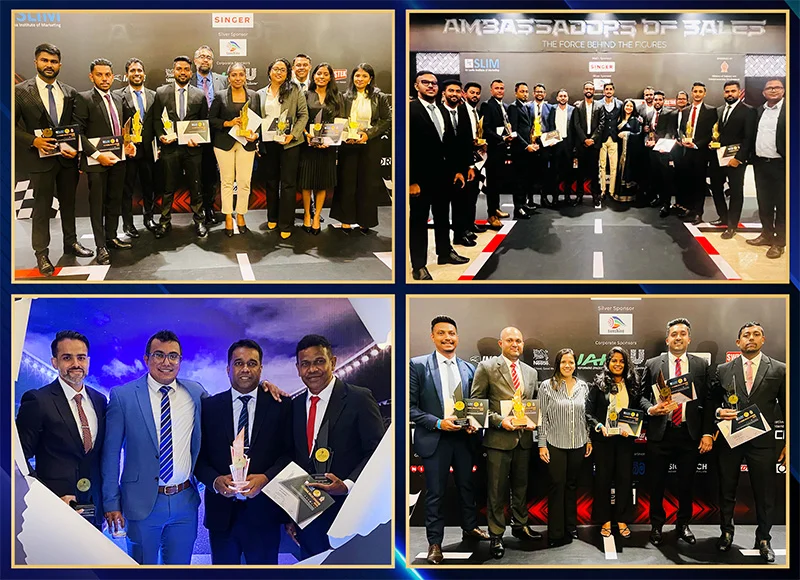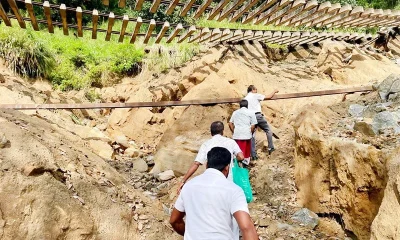Business
CA Sri Lanka continues to champion integrated reporting

A team from John Keells Holdings PLC discusses the benefits of integrated reporting with IRCSL chairman Asite Talwatte.
President of the Institute of Chartered Accountants of Sri Lanka (CA Sri Lanka), Manil Jayesinghe recently continued to push companies in Sri Lanka to adopt integrated reporting and integrated thinking if companies were truly keen in remaining sustainable and successful in the long term.
Addressing a forum on integrated reporting organised by CA Sri Lanka recently, Jayesinghe urged companies and professionals to adopt the integrated reporting framework for their maximum benefit as it is an important stepping stone that will not only help organisations to bring about integrated reporting but also the key element behind it, which is integrated thinking.
“The world has shown us that profits alone is not the real driver, and we have so many things happening around in the world right now and today health and safety is the key priority for companies, and tomorrow it can be something else,” he said.
Jayesinghe elaborated that profit is no longer the key benchmark of success as there were many other factors to consider in benchmarking success including environment, human capital, and society, among other factors. “It is important to make sure that your business is a sustainable business and for this integrated thinking needs to come through and by adopting integrated reporting, corporates will achieve this,” he added.
Jayesinghe shared these thoughts during a discussion featuring John Keells Holdings PLC on their ‘winning story’ in adopting integrated reporting within the organisation.
He also highlighted that since the inception, CA Sri Lanka has recognised the importance of integrated reporting and has taken the leadership in popularising the concept of integrated reporting among corporates in Sri Lanka. “With new events taking place around the world as well as in Sri Lanka, I hope integrated reporting will have better visibility and companies will start adopting integrated reporting as one of their forms of reporting,” he said.
He added that CA Sri Lanka has taken steps to provide all necessary technical, financial and institutional support to the Integrated Reporting Council of Sri Lanka (IRCSL) headed by Mr. Asite Talwatte to carry out the task of promoting integrated reporting and integrated thinking among corporates in Sri Lanka.
Delivering his company’s success story in adopting integrated reporting, Mr. Mohan Thanthirige, Group Finance Controller of John Keells Holdings PLC highlighted that integrated reporting is articulating the different business processes where everyone can accept it.
“We felt that with our stakeholders getting more sophisticated, we too needed to step up in our reporting,” he said. During the forum, it was highlighted that at numerous stakeholder engagement related studies conducted by John Keells Holdings, more and more stakeholders were asking questions in relation to non-finance that the conventional financial reporting seen in annual reports.
Mr. Thanthirige explained that it was important to look at what is best for one’s organisation in terms of culture and infrastructure. “We did so many test runs and it was a long journey with failures and wins, to get here in terms of ensuring our integrated reporting was a success story,” he added.
The forum concluded following a panel discussion which was moderated by Mr. Asite Talwatte, Chairman of the IRCSL. The panel session featured Mohan Thanthirige, Kalpa Munasinghe, Manager Group Finance, Eneeshya Perera, Manager Corporate Finance, Devmi Jayaweera, Assistant Manager – Sustainability, ERM and Group Sourcing, Daniella De Mel, Assistant Manager – Corporate Finance and Mayurika Silva, Assistant Manager – Group Finance.
Business
Sri Lanka Tourism makes a strong impression at CMT 2026 in Stuttgart, Germany

Sri Lanka Tourism marked its presence at CMT 2026, held in Stuttgart, Germany, one of the largest consumer travel fairs in Europe. The Sri Lanka Stand accommodated representatives from the local tourism industry, providing a valuable platform to connect directly with the German travel community, particularly travellers with long-haul travel intentions.
Sri Lanka’s participation at CMT 2026 enabled direct engagement with consumers and helped stimulate interest in exploring the country’s diverse and year-round travel experiences. This presence addressed a long-standing need for Sri Lanka Tourism to participate in major consumer-focused travel platforms, effectively taking destination promotion directly to the travellers’ doorstep.
A wide range of travel packages, customised itineraries, accommodation options, and experiential offerings were presented to interested German consumers by Sri Lankan DMCs, under the umbrella of Sri Lanka Tourism. The platform also allowed potential travellers to clarify concerns and queries related to planning travel to Sri Lanka through direct, face-to-face interactions with industry professionals.
These direct engagements enabled Sri Lankan industry participants to gain valuable insights into emerging travel interests, changing consumer behaviour, and evolving customer expectations in the German market. The face-to-face discussions with end consumers strengthened the industry’s understanding of demand trends and product requirements.
Strategically, Sri Lanka Tourism’s focus on B2C promotions serves as a catalyst for strengthening B2B platforms, ensuring that final decision-makers—the travellers—are actively engaged alongside trade partners. This alignment enhances the overall effectiveness of trade collaborations. Well-designed consumer promotion activities, including giveaways, contests, experiential engagements, and cultural performances, created emotional connections with visitors, improved destination recall, and reinforced Sri Lanka’s positioning as a compelling long-haul destination. (Sri Lanka Tourism)
Business
Adora raises the bar for hospital-backed aesthetic care in Wattala

Dr. Piyumini Gunasekara on advanced non surgical treatments
Hemas Hospitals has strengthened its regional healthcare positioning with the launch of Adora Cosmetic Centre at Hemas Hospital Wattala, introducing a hospital-backed, clinically governed model of aesthetic medicine at a time when South Asia’s cosmetic sector is expanding faster than regulation.
Unlike standalone cosmetic clinics, Adora is fully integrated into the Hemas Hospital ecosystem, embedding aesthetic services within hospital-grade infrastructure, multidisciplinary medical support and internationally aligned clinical governance.
Speaking at the launch, Dr. Lakith Peiris, Managing Director of Hemas Hospitals & Labs, said the centre represents a deliberate shift in strategy.
“Adora is not about cosmetic enhancement alone. It is built on protocols, trained clinicians and governance. As healthcare providers scale across the region, safety and medical credibility must remain non-negotiable,” he told The Island Financial Review.
The centre is positioned as a health-class facility, combining advanced aesthetic technologies with evidence-based medical pathways. This approach addresses growing regional concerns over unregulated cosmetic practices, offering patients reassurance through professional oversight and ethical medical standards.
Prabhan Gunawardena, Director General Manager of Hemas Hospital Wattala, said the initiative reflects both clinical responsibility and business foresight.
“The cosmetic industry is evolving rapidly across South Asia. Adora demonstrates how innovation can be scaled responsibly when anchored in medical expertise and hospital governance,” he said.
Detailing the centre’s scope, Dr. Piyumini Gunasekara, Medical Officer – Adora Cosmetic Centre, said treatments are designed to address medical and aesthetic concerns through personalised, evidence-based care.
She told The Island Financial Review:”We offer advanced non-surgical treatments for concerns such as hyperpigmentation, acne and acne scarring, fine lines and wrinkles, collagen loss, enlarged pores, rosacea, UV damage, excessive sweating, warts and moles. Every procedure is clinically assessed and delivered within a hospital-backed framework to ensure safe and sustainable outcomes.”
Clinical governance remains central to operations, reinforced by Dr. Malith Atapattu, Director – Medical Services and Quality, who highlighted the importance of protocol-driven care in a sector often challenged by inconsistent standards.
As Sri Lanka positions itself as a regional healthcare and medical tourism destination, hospital-led aesthetic centres such as Adora signal a broader industry shift—where growth is aligned with governance, trust and long-term sustainability.
For Hemas Hospitals, Adora represents a calculated entry into a high-growth segment without compromising medical integrity. For the region, it underscores a clear message: the future of aesthetic care lies in hospital-backed, clinically governed models—not cosmetic shortcuts.
By Ifham Nizam
Business
John Keells Consumer Foods Sector dominates SLIM National Sales Awards 2025 with landmark wins

The John Keells Consumer Foods Sector (JKCF) has reinforced its standing as a powerhouse in Sri Lanka’s FMCG industry with an exceptional performance at the SLIM National Sales Awards 2025, securing an impressive total of 27 awards. This remarkable achievement reflects the sector’s unwavering commitment to building high-performing teams, nurturing sales excellence, and driving sustained growth across its diverse business verticals.
Representing the iconic brands of Ceylon Cold Stores PLC (CCS), Keells Food Products PLC (KFP), and Colombo Ice Company (CICL), JKCF has long been recognized for its rich legacy of innovation and leadership in beverages, frozen confectionery, and processed foods. Its long-standing focus on people capability and performance culture continues to fuel industry-leading achievements, with the latest recognition at SLIM NSA 2025 marking one of the largest collective wins by a single organization in the event’s history.
-

 Opinion5 days ago
Opinion5 days agoSri Lanka, the Stars,and statesmen
-

 Business6 days ago
Business6 days agoClimate risks, poverty, and recovery financing in focus at CEPA policy panel
-

 Business4 days ago
Business4 days agoHayleys Mobility ushering in a new era of premium sustainable mobility
-

 Business1 day ago
Business1 day agoSLIM-Kantar People’s Awards 2026 to recognise Sri Lanka’s most trusted brands and personalities
-

 Business4 days ago
Business4 days agoAdvice Lab unveils new 13,000+ sqft office, marking major expansion in financial services BPO to Australia
-

 Business4 days ago
Business4 days agoArpico NextGen Mattress gains recognition for innovation
-

 Business3 days ago
Business3 days agoAltair issues over 100+ title deeds post ownership change
-

 Business3 days ago
Business3 days agoSri Lanka opens first country pavilion at London exhibition



















